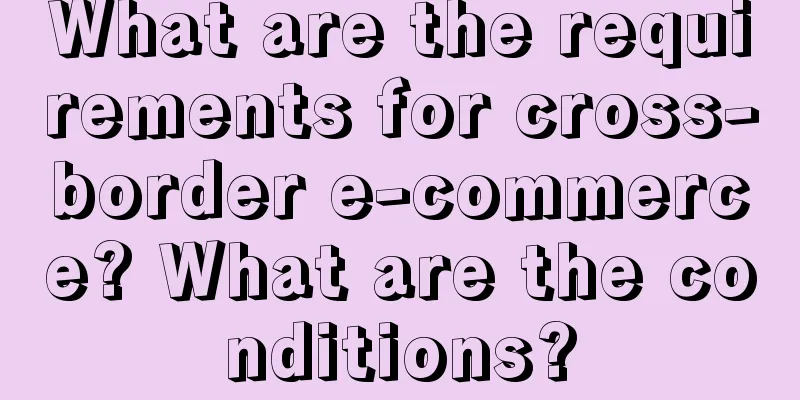What are the requirements for cross-border e-commerce? What are the conditions?

|
Although cross-border e-commerce started late, it is growing fast. Moreover, there are not many domestic merchants doing cross-border e-commerce business. It is relatively abundant in the domestic market and the competition is not so fierce. So what are the conditions for cross-border e-commerce? What conditions are required for cross-border e-commerce? 1. Language communication skills Cross-border e-commerce requires doing business with foreigners, and the basic tool for communication is language. Although English has a wide range of applications, the native language of some countries still needs to be used, such as South Korea, Japan, Thailand, etc., so language skills are the first step to enter this industry. 2. Basic knowledge of e-commerce When doing cross-border e-commerce, even if you have language skills, you should not rush around like a headless fly. It is necessary to understand the platform operation and foreign trade-related laws and regulations in the early stage. Read more news and information about related platforms. You should know how to analyze the market, store sales, product analysis, keywords, etc. Start learning in a targeted manner and lay a good foundation for yourself. 3. Crisis Protection Awareness Several abilities are required, including awareness of product intellectual property protection, the ability to master relevant market laws and regulations, and the ability to handle international logistics and customs declaration and inspection. Although such problems rarely occur in normal times, once they occur, it is possible to lose everything. 4. Product familiarity and after-sales service capabilities Customer satisfaction is a necessary condition for determining a hit product, and it is very critical. Strengthen your familiarity with the product, continuously optimize the entry point and selling point of sales, and continue to accumulate word of mouth through improved after-sales service. 5. Platform operation capabilities At present, there are many cross-border e-commerce platforms, the mainstream ones are Amazon, AliExpress, eBay, Wish, and Dunhuang.com. In addition to the daily operation of the store, you must continue to pay attention to the rules and policy changes of each platform and keep abreast of the latest developments in order to make the store more stable. 6. Off-site marketing capabilities In addition to advertising within the platform, off-site traffic also needs to be expanded. In general, cross-border e-commerce requires language communication skills, basic e-commerce knowledge, crisis protection awareness, product familiarity and after-sales service capabilities, platform operation capabilities, and off-site marketing capabilities. |
<<: What products can you sell on Amazon Japan to make money? These categories are easy to sell!
>>: Is Shopee cross-border e-commerce really profitable? Is there a fee for opening a store?
Recommend
When going to Latin America, be careful about being sued by your employees | Nine insights into Latin American consumption
The Latin American market is becoming a new blue o...
Who is buying ice cups for 4 yuan?
Why do so many consumers choose to buy expensive i...
With 4.8 million private domain users and GMV exceeding 100 million, how does beauty retail giant Sephora plan its private domain?
Beauty and cosmetics are one of the fastest growin...
Stress relief and squeezing are very popular, and the emotional value business is becoming popular
"Squeeze toys" are currently very popula...
In what cases does Amazon need to pay VAT? How to declare Amazon VAT?
When selling on Amazon, sellers need to comply wit...
What should I do if the Amazon title does not match the product? How to write a title?
Everyone has a different way of dealing with probl...
Is it difficult to get an eBay business store? What are the models?
If you want to join eBay, you can join through two...
How often are Shopee's preferred sellers updated?
Many Shopee merchants want to become preferred sel...
Do I need to pay tax when I buy things on Amazon Japan? Do I need to pay consumption tax?
When we buy things on domestic e-commerce platform...
With 1.58 million followers in a single month, Xiaohongshu has seen a "big comeback" by the end of the year
In just one month, the number of followers increas...
How to unblock a frozen store on Shopee Thailand? What is the reason for the freeze?
No matter what platform you operate your store on,...
Which countries are Wish's main markets? What are the hot-selling categories?
Wish is a relatively well-developed cross-border e...
Can I do cross-border e-commerce by myself? How can I do it by myself?
When it comes to cross-border e-commerce, many peo...
What does foreign trade inventory mean? How to deal with it?
Foreign trade refers to foreign trade, which can b...
What bank cards does eBay support? Can eBay use UnionPay cards?
The products on the eBay cross-border e-commerce p...






![This is the best data analysis I have ever seen [Annual Work Plan]](/upload/images/67e74d68cca61.webp)


